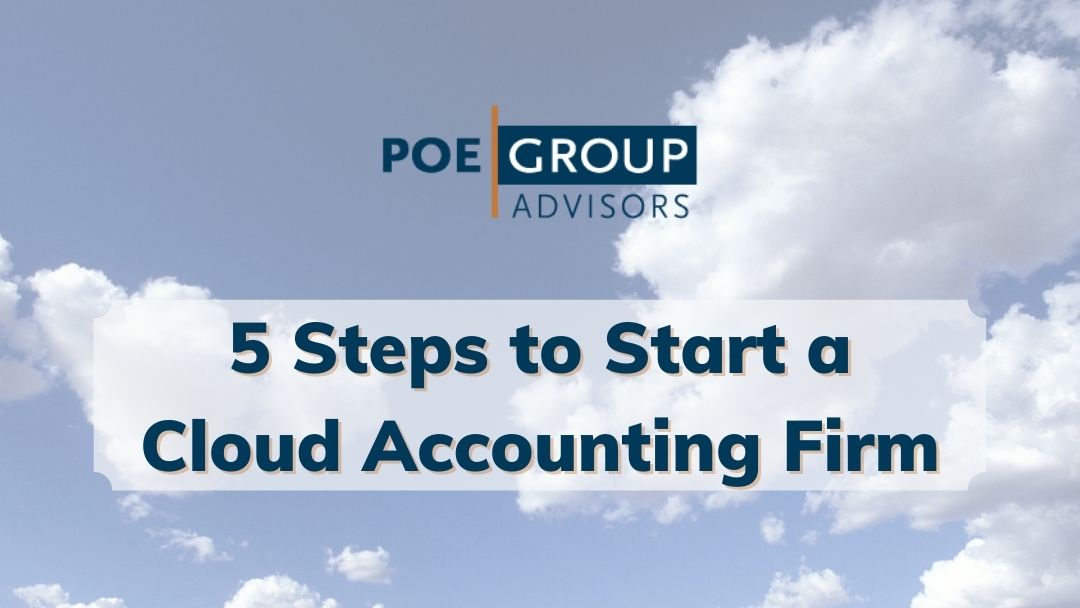Blog edited: 6/20/2024 by Poe Group Advisors with some of our own additions and advice
Blog originally written By Ryan Lazanis
We rarely publish guest posts, but we had so much positive interest in the Podcast we did with Ryan, we wanted to share more of his incredible insights. Ryan is also a past client of Poe Group Advisors’ and has started a company called Future Firm which provides resources & consulting to firms looking to setup an online, automated and modern firm of their own. ~ Brannon Poe
What is a cloud accounting firm or a Virtual CPA practice? There is certainly a range to what what is considered cloud. For our purposes at Poe Group Advisors, we classify a virtual accounting practice as a firm that does not meet with any clients in person and has a remote staff. We consider a firm to be a hybrid cloud CPA firm when they still have a physical office with remote capable employees and meet most of their clients virtually. If an owner is able work remotely to service clients and manage a team, that is a good sign that your pool of buyers can be anywhere and this makes for a more marketable practice when it comes time to sell.
So you want to transition your traditional accounting firm into a cloud-based accounting firm?
Awesome! I strongly believe that being able to offer your services in the cloud is important to better compete in the digital age and to achieve something that’s more automated for you and your clients. But what are the steps to start a cloud-based accounting firm? This article will outline some points in relation to this. Contrary to popular belief, there’s more to it than just picking out some slick cloud accounting apps.
As someone that started a cloud accounting practice from scratch and sold it only 5 short years later, I have first-hand knowledge of what it takes to start and grow a successful cloud accounting firm that focuses on providing an automated, high-quality customer experience.
At a very high level, a cloud accounting firm is a firm that focuses on using technology to automate processes and offer services in a more virtual, paperless setting. The end result is an accounting firm that is more efficient, more scalable, and draws more revenue.
While the steps below are certainly just the tip of the iceberg, let’s take a look at what you should consider when you start a cloud accounting firm.
Step 1 – Understand your purpose
First off, the start of any new service offering has to start with a purpose (if you haven’t seen it, check Simon Sinek’s famous Start With Why video). Many I speak with want to move to cloud-based software to modernize their service offering in order to improve the experience that their customers are receiving, so that’s a good way to start.
Whatever it is, there has to be a reason for doing what you are doing. The most successful businesses out there have a purpose, a raison d’être (sorry, that’s the French Canadian side of me coming out). That’s because they have a goal and a direction that they want to ultimately achieve which helps steer the ship.
For instance, when I started my firm years back (before cloud accounting was even a thing), I wanted to make accounting easy for small business owners and devise a service that eliminated the pain that most small business owners feel when dealing with their accounting. I knew accounting was painful for them and I wanted to do something about it.
This sense of purpose helped me think about my service offering in new ways, it helped me search for the technology required to support pain-free accounting solutions and it helped me innovate. I was laser-focused on this purpose, it drove the direction of the firm and it helped garner buy-in from customers and employees.
Have a purpose and map out your trajectory for how you’ll get there. Being in the cloud and using cloud accounting software is just one component of the larger picture.
Some accountants may question if a CPA can be fully virtual when deciding to move from a traditional firm to a cloud accounting firm. The answer is a resounding yes. A virtual CPA can be more niched as your client base is not limited to your local region. You can get really focused on specific types of work which helps you offer more expert advice. In the age after Covid, it is easy to build the same personal relationships with your clients over video calls.
Step 2 – Know your target market
Maybe you have a firm already or maybe you’re building a startup from scratch, but the typical market that you might have been dealing with is not the same market in the cloud accounting space.
The ones purchasing services from a “traditional” firm may be used to traveling to the office, signing papers, dealing with inefficiencies and getting billed by the hour, but the ones shopping for a cloud accounting service are looking for just the opposite most of the time. If you are already providing accounting services in a more traditional setting, then your current practices will likely need to evolve to adapt to the customers interested in a different kind of service, unless your current clients are looking to migrate over to a more modern service offering.
(Since this blog was originally written in 2018, the adaptability of your traditional clients have probably changed. You may have had to convert clients out of necessity during the pandemic. Everyone is more familiar with business dealings via phone or video. I think you will find that traditional clients may be more amenable to a shift to the cloud than they would have been five years ago.)
If you already have a firm and a client base, you might want to create a survey to see how many of your current clients would be interested in switching to a more digital and more automated offering. Not all of them will want it, but this could be a good way to start a cloud accounting firm.
Either way, if you want to start a cloud accounting firm from scratch or with your current customer base, you need to map out who you’re targeting, what they value and what their pain points are before actually developing your service offering.
Poe Group has observed one paint point is client trust of the portal system. Some CPAs have voiced concern their clients won’t trust uploading documents to a portal. This could be an opportunity to explain that virtual accounting is safe as portal systems are encrypted and have security features to help protect client data. This may be something important to share with older clients who still feel most comfortable dropping off documents at your office.
Step 3 – Model your service offering
Cloud accounting services are typically synonymous with a more real-time, more recurring business model. The old way of offering your services was once a year at the end of the year where you send out your bill after the fact. One of the reasons for that was likely due to the lack of proper technology to easily collaborate seamlessly and efficiently throughout the year.
The benefit of cloud accounting technology, however, it’s easy to collaborate with your customers no matter where you are in the world and to automate more of the work than was previously possible. This results in a service offering that can be offered in a more real-time fashion mirroring the expectations of clients in the digital age. One popular model these days is a subscription offering as the frequency of payments lines up better with the delivery of services.
Taking your existing service offering (of let’s say providing once a year tax services) and bringing it into the cloud accounting world will not be effective because:
- The use of cloud computing won’t provide any real benefit to the client.
- Trying to build your current offering into a subscription model will likely not work because you’re delivering value once a year and charging each month.
How do I know? Because my firm used to offer the same once-a-year compliance services in a subscription format and very quickly realized clients weren’t going for it.
So if you do want to start an accounting firm with cloud-based solutions and help collaborate more closely with clients as well as automate more of their work, in my experience, you need to package your services in a way that makes sense and provides continuous value for your target audience.
This is easier said than done and requires a good amount of time to really perfect your productized subscription model. I’m not saying that you need to provide a subscription model if you start a cloud-based accounting firm, but it’s certainly the most prevalent model these days.
Step 4 – Document your processes
Cloud accounting firms are super process-oriented. Why? Because they are focused on automation. Before you can automate a process though, you need to first know your process.
For instance, if you want to automate the reconciliation and bookkeeping process, you need to understand how you’ll collect receipts & bank statements, how your team will interact with your customers, the steps required to close the month-end, etc. There are steps required to get you from an unfinished set of books to a finished set of books, so this particular process should be documented and understood amongst the team.
From there, you can identify areas that are particularly inefficient and repetitive for which you can then see if there’s a piece of software available to automate that repetitive task. Selecting technology is the last thing you want to do. Know your processes first, understand what’s inefficient and then apply software to automate it.
Many accounting practitioners want to know if this cloud technology will be expensive. The answer is, yes and no. Yes, your upfront costs may increase, but after implementation, the automation cuts down on man-hours and offers capacity to concentrate on more lucrative work. The end is a net positive on the bottom line for your practice.
Step 5 – Select and implement the right technology for your cloud-based accounting firm
And finally, we arrive at the last step in the process, which is typically the only step that most think about when they want to start a cloud accounting firm; selecting and implementing the right technology to run your cloud accounting firm. Don’t get me wrong, this is an absolutely critical step of the plan to get right, but as you can see, there’s a lot more to a successful cloud accounting firm than just the technology.
At its core, if you’re going to be offering cloud accounting services, you’ll need to select a cloud accounting system to base your practice on. QuickBooks Online and Xero are the 2 leaders here. From there, you’ll want a variety of other pieces of software to help offer a streamlined service offering. These can be communication apps, practice management apps and more. We will not go into great detail on the different pieces of software here (but if you are interested, I suggest you click here to subscribe to my weekly newsletter to keep in the loop on the latest trends in technology, marketing and practice management for your firm), but this step is obviously exceptionally important.
Also, there are many firms out there that use Xero or QuickBooks Online, but they are not cloud accounting firms. They haven’t implemented the service with a particular purpose in mind, they haven’t modified their approach even though they are dealing with a different target market, they haven’t changed the way they model their services and they don’t know their processes so they aren’t automating much. All they have done is slapped QBO or Xero into their practice. That’s not going to do much and that’s certainly not the right way to start a cloud accounting firm.
Anything else?
Poe Group Advisors would recommend that you make sure as you make a shift into cloud accounting, that you make sure you have a good website. This will not only serve as a landing page to attract new clients, but it is an essential place to post you service packaging, offer information on your mix of services and is likely where your clients can access their client portal.
Is it possible to give a complete guide to start a cloud accounting firm in 1500 words? Definitely not. But the above demonstrates that there’s a lot more to starting a cloud accounting service rather than to just thinking about implementing cloud accounting software. Running a firm in the digital age requires a different thought process and I believe that cloud-based solutions are an essential offering for all bookkeeping and accounting firms wishing to stay competitive.
At the end of the day, most of you out there decided to start a firm to truly help your clients. You have been doing that well for many years. Setting up a cloud accounting firm is the next evolution in the accounting model to truly help get you and your client to the next level and to reach your goals. It may take time, and effort, but creating a cloud accounting practice will create value for your clients and you and your staff.
To see Poe Group Advisors’ recommendations on scaling your cloud firm, check out our book, Scaling Your Cloud Accounting Practice

About the Author: Ryan Lazanis, CPA, CA. In 2013, Ryan founded Xen Accounting, a 100% cloud-based accounting firm. Following its successful acquisition in 2018 lead by Poe Group Advisors, Ryan started Future Firm which provides resources & consulting to firms looking to setup an online, automated and modern firm of their own.
To keep your firm in the loop, click here to subscribe to Ryan’s weekly newsletter that summarizes the top 5 hottest resources on the internet to know about each week to help evolve your firm into the future.
Looking to purchase a Cloud-Based Accounting Firm? Poe Group Advisors gets new opportunities all the time. Register Today to receive email notifications.





